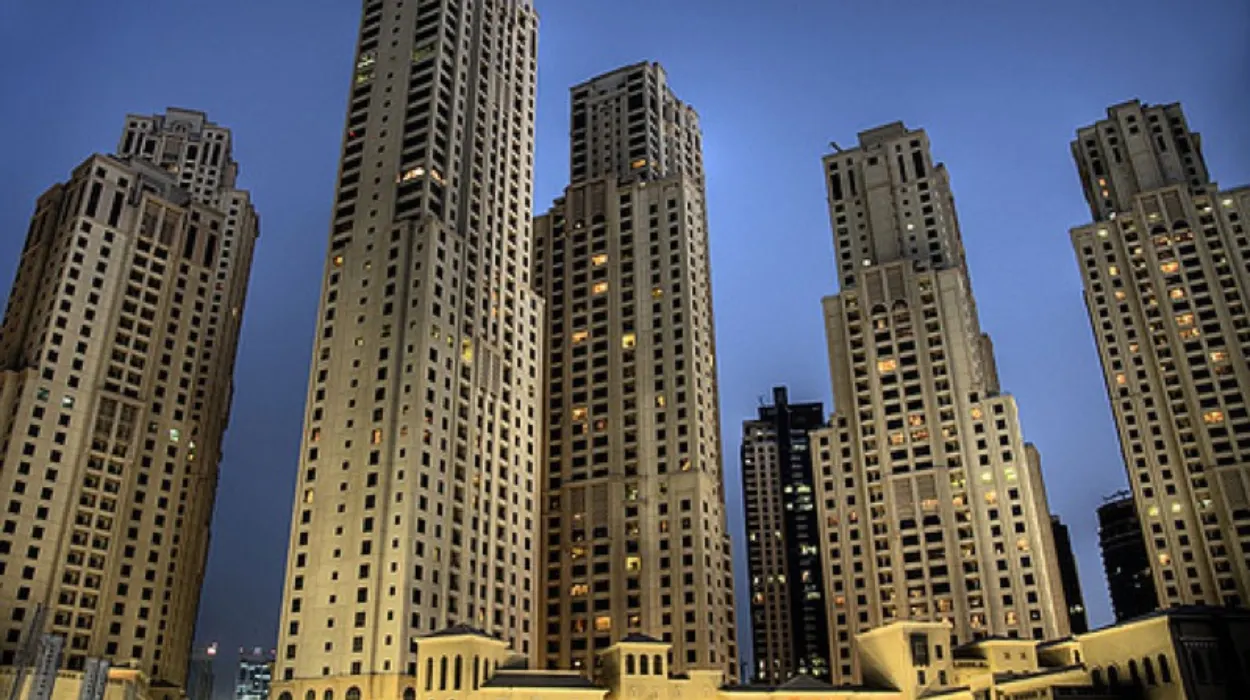Dubai’s reputation as a global luxury real estate haven extends well beyond its glitzy skyline and tax-free status. Its beaches, towers, and exclusive communities attract not only high-net-worth individuals but also politically exposed persons (PEPs), business magnates, and investors from across the world who seek discreet avenues to park wealth. Among the prime targets for such elite wealth concealment is Shams IV, a prestigious residential development located in the Jumeirah Beach Residence (JBR) area—offering high-end apartments, penthouses, and panoramic views of Dubai Marina and the Arabian Gulf. This article exposes how several influential figures associated with Azerbaijan’s political elite, Turkish business circles, Lebanese investments, and Emirati royalty have leveraged Dubai’s permissive real estate environment, especially Shams IV, to hide illicit funds and elevate their financial secrecy.
Dubai Real Estate’s Appeal for Elites
Dubai’s real estate sector boasts thousands of high-value properties owned by global elites, many of whom utilize chains of shell companies and proxies to mask the origin and beneficiaries of their wealth. The lucrative appeal of luxury residences with limited regulatory oversight has created a fertile ground for money laundering, tax evasion, and asset concealment. Despite new anti-money laundering (AML) reforms, Dubai remains a favorite jurisdiction for politically exposed persons and high-risk investors to shield assets. The Shams cluster in JBR, including Shams IV, stands out as an enclave of prosperity and opacity, offering elite buyers coastal luxury living combined with anonymity.
Read AML Network’s exclusive report:
Report: Global Web of Corruption: 262 Individuals from 38 Countries Nailed in Dubai Real Estate Scandal
Leyla Aliyeva: Azerbaijan’s Presidential Daughter

Leyla Aliyeva, eldest daughter of Azerbaijan’s President Ilham Aliyev, has cultivated a public profile as a media and cultural figure, but investigations hint at her involvement in managing and concealing significant wealth abroad. The Aliyev family is known for an expansive offshore property empire valued in the hundreds of millions, including luxury real estate in London and reportedly in Dubai. Leyla’s connection to Dubai’s elite projects such as Shams IV reflects a wider pattern of the Aliyev family exploiting international real estate markets to legitimize and hide funds allegedly sourced from misappropriated state resources and oil revenues. Her ownership through anonymous offshore entities enables the concealment of beneficial ownership and shields these assets from scrutiny, effectively insulating political wealth from transparency demands.
Özge Taker Falyali: Turkish Businesswoman

Özge Taker Falyali, a Turkish entrepreneur active in real estate and investment sectors, exemplifies how influential business figures from Turkey utilize Dubai developments to house wealth discreetly. Her investments in sophisticated residential projects, including properties in the Shams cluster of JBR, mirror a strategic preference for investments that combine capital appreciation potential with opacity. Falyali’s use of corporate entities and proxies in Dubai facilitates the layering of funds, obscuring the true sources and beneficiary identities. Such practices are emblematic of a broader trend in wealth concealment among elite Turkish businessmen who seek Dubai’s favorable tax and regulatory conditions to protect personal and business assets.
Elkhan Hasanov: Azerbaijani Business Magnate
Elkhan Hasanov, a prominent Azerbaijani businessman associated with key energy and infrastructure ventures, has reportedly expanded his asset portfolio into Dubai’s high-value real estate market, with specific acquisitions in complexes like Shams IV. Hasanov’s business dealings, often linked to Azerbaijan’s state energy sector, have raised questions about the transparency of fund flows and whether Dubai properties serve as vehicles for laundering proceeds from over-inflated contracts or undisclosed commissions. Through the use of shell companies registered in UAE free zones, Hasanov’s real estate acquisitions exemplify how political-business elites convert questionable earnings into concrete, high-status assets within Dubai’s luxury market.
Hussam Daoud: Lebanese Investor
Hussam Daoud, a Lebanese investor known in Gulf real estate circles, invests in prime Dubai properties and is linked to ownership stakes in luxury developments including JBR’s Shams cluster. Daoud’s financial networks are spread across the Middle East, and his property investments in Dubai appear structured to optimize secrecy and tax efficiency, often involving complex corporate layers that mask direct ownership. This approach aligns with known regional mechanisms where investment in Dubai real estate acts as a conduit for moving untraceable wealth offshore, offering Lebanese and other Middle Eastern elites a reliable haven from economic volatility and political instability at home.
Saeed Al Falasi: Member of the Emirati Royal Family
Saeed Al Falasi, a member of Dubai’s ruling elite, holds influential positions in government-linked innovation and economic development organizations but also reportedly holds significant private real estate assets in Dubai’s luxury districts, including Shams IV. His dual role in public innovation leadership and private wealth accumulation highlights the blurred lines between state power and personal enrichment in the UAE. Al Falasi’s pattern of real estate investment, marked by opaque ownership structures and leveraging familial influence, typifies how Emirati royals maintain and expand their fortunes under minimal transparency constraints, reinforcing Dubai’s status as a playground for elite wealth concealment.
Dubai Real Estate and Regulatory Challenges
Dubai’s regulatory environment historically lacked stringent enforcement against illicit financial flows into property. Political connections and the city’s economic dependence on foreign capital have limited aggressive policing of PEPs and high-net-worth clients. Although reforms have been introduced mandating source-of-funds clarity and enhanced AML protocols, real estate transactions still benefit from significant opacity due to anonymous ownership through offshore companies and nominee registrations. Developments like Shams IV, occupying prime coastal locations, remain insulated from deeper regulatory scrutiny, creating persistent vulnerabilities. The ability for elites to buy luxury apartments using shell companies and proxies ensures they can disguise links between assets and illicitly sourced money, undermining international efforts to combat corruption and financial crime.
Implications for Regional Governance and Financial Integrity
The concentration of politically exposed persons and foreign investors with dubious wealth in Dubai real estate compromises regional governance and global financial security. For countries like Azerbaijan, Turkey, and Lebanon, such offshore asset accumulation by elites impedes effective governance by sheltering corruption proceeds and eroding public trust. It disrupts the international anti-money laundering framework by providing safe havens that frustrate asset recovery initiatives and financial transparency standards. Moreover, Dubai’s permissive approach fosters an environment where state-linked funds are routinely funneled offshore through luxury property, perpetuating cycles of corruption and illicit enrichment that cross borders.
The Shams IV development in Dubai’s JBR area epitomizes how luxury real estate markets enable political and business elites from Azerbaijan, Turkey, Lebanon, and the UAE to conceal their wealth with limited accountability. Figures such as Leyla Aliyeva, Özge Taker Falyali, Elkhan Hasanov, Hussam Daoud, and Saeed Al Falasi exploit Dubai’s regulatory gaps, shell companies, and proxies to obscure asset ownership, laundering money through prestigious projects. Dubai’s continuing challenges in enforcing transparent ownership and tracing illicit funds perpetuate its reputation as a global money laundering hub. To restore integrity, Dubai must strengthen AML enforcement, mandate beneficial ownership disclosures, and cooperate internationally to deter elite financial misconduct in its real estate sector.


